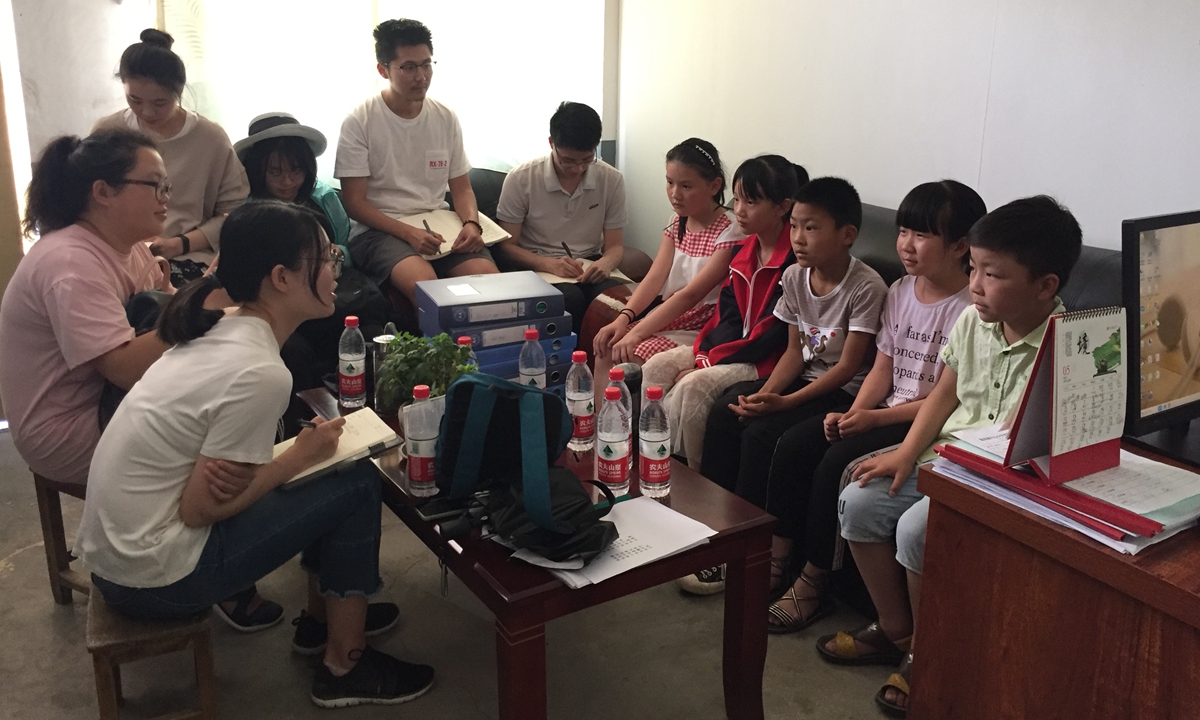Actions needed to ‘scale down smartphone addiction among left-behind children’ as survey shows rising trend
Tied to devices

College student volunteers give lessons to children in Huairen, Southwest China's Guizhou Province on July 21, 2021. Photo: VCG
A latest research on the left-behind children showed that 67.3 percent of the families surveyed had witnessed a trend of mobiloholic in their children, among which 21.3 percent said the children become seriously addicted to smart phones.
In China, left-behind children refer to minors under 16 whose parents both go out of the hometown to work, or one of them goes out to work, and the other is incapable of guardianship. According to a report released by researchers from the Northeast Normal University, there were nearly 12 million left-behind children in elementary and middle schools in China's rural areas in 2021, decreasing by more than 10 million compared with 2012.
Since 2021, researchers from the university had visited 10 counties and districts in Henan, Hubei, Hunan and Jiangxi provinces - where there are high proportion of left-behind children - and discovered that cellphone addiction has become a main problem among the group.
Cellphone addiction has a negative impact on children's physical and mental health, study and life, and family relationships, the researchers found.
Analysts call on the government to take action to intervene and protect left-behind children from cellphone addiction and better take care of the group.

Researchers from China Rural Governance Research Center, Wuhan University (WHU) talk to a group of left-behind children. Photo: Courtesy of Yi Zhuo
Falling into smartphone addiction
According to the survey, watching short videos (69 percent) and playing cellphone games (33.3 percent) have become main activities of surveyed left-behind children on the internet.
More than 40 percent of the surveyed left-behind children have their own smart phones and nearly 50 percent can use grandparents' phones, according to the survey.
In a middle school in a township in Southwest China's Guizhou Province, researchers found some left-behind children can play cell phone games for consecutive five days and nights without taking any sleep.
In a grade six class in an elementary school in a county in Jiangxi, half of the students spend more than 10 hours playing cell phones at home during the weekend, Yi Zhuo, a postdoctor at the China Rural Governance Research Center, Wuhan University (WHU), and one of the researchers who organized the abovementioned survey, gave some extreme examples they discovered during the survey to the Global Times.
The problem is most severe among children aged 10-15 and shows a trend of lowering ages, Xia Zhuzhi, a deputy professor at the WHU China Rural Governance Research Center, told the Global Times.
The rapid development of the internet makes it easier and easier to get access to the internet so that few children in rural China do not have access to the internet, Xia explained.
The lack of supervision from families makes it possible for these children to play on their smartphones for a long period.
In rural areas, the grandparents have to do farm work or have their own jobs, so it is impossible for them to spend all the time taking care of the children. Some of them use cellphones as electronic baby-sitters and do not have enough knowledge of the impact of cellphone addiction, according Xia.
The problem has worsened after the rise in online teaching during the COVID-19 epidemic that broke out in early 2020, Yi noted.
Surveyed teachers complained to the researchers that they found more students falling asleep and have difficulties staying concentrated in class after schools resumed offline classes after the epidemic. Indulging in mobile phones while ignoring outdoor physical exercise is also hurting the group.
During a routine physical examination in 2021 at a middle school in a county in Hubei, it was found that 30 percent of the students in the first grade had severe vision loss, and two-thirds of the students in a class in the third grade wore glasses. A class teacher told the WHU researchers "nowadays, children's poor health and myopia are not caused by learning, but by playing with mobile phones."
Mobile games and the internet have also become important media for inducing rural minors to commit crimes. The WHU researchers learned from the procuratorate in Enshi, Hubei, that 60 to 70 percent of the sexual assault cases of minors in this city in the first half of 2021 occurred through online dating or playing games. Surveyed local officials said that, in the first half of 2021 alone, the number of sexual assault cases related to minors exceeded the sum of the three years of 2017, 18, and 19.
More actions needed
The WHU survey recommended cellphone management courses in school curriculums, so that students can learn about the harmful effects of cellphone overuse. It also called for more government regulations of online games and short-video and livestreaming platforms.
China in 2021 introduced new rules that limit the amount of time under-18s can spend on video games to three hours a week, a move it said was necessary to combat gaming addiction.
In February this year, the country took a latest step announcing to step up the management of short videos as part of efforts to prevent children from becoming addicted to them.
Cellphone addiction is just a concentrated reflection of the situation of children left behind in rural areas, which had long been a focus of Chinese society and Chinese policymakers.
To protect the group, it requires more government efforts to comprehensively take care of their education, physical and psychological condition, and medical care. Conditions should also be created to enable migrant workers' children to go to schools in urban areas with equal rights and interests with urban students, according to Xiong Bingqi, director of the 21st Century Education Research Institute.
Chinese lawmakers and political advisors are trying to help. They had actively made specific suggestions on the issues at the just concluded two sessions.
Lu Ming, an expert from Shanghai Jiao Tong University and a member of the 14th National Committee of the Chinese People's Political Consultative Conference, suggested that local governments should guarantee migrant workers' children can go to schools where they live and devote more money to related work.
From 2010 to 2022, Chinese governments have trained about 660,000 people in villages as child-welfare directors to take care of local left-behind children.
